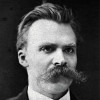“ The man of an age of dissolution which mixes the races with one another, who has the inheritance of a diversified descent in his body—that is to say, contrary, and often not only contrary, instincts and standards of value, which struggle with one another and are seldom at peace—such a man of late culture and broken lights, will, on an average, be a weak man. ”
Friedrich Nietzsche, Beyond Good and Evil (1886). copy citation
| Author | Friedrich Nietzsche |
|---|---|
| Source | Beyond Good and Evil |
| Topic | age peace |
| Date | 1886 |
| Language | English |
| Reference | |
| Note | Translated by Helen Zimmern |
| Weblink | http://www.gutenberg.org/files/4363/4363-h/4363-h.htm |
Context
“In spite of all, what a blessing, what a deliverance from a weight becoming unendurable, is the appearance of an absolute ruler for these gregarious Europeans—of this fact the effect of the appearance of Napoleon was the last great proof the history of the influence of Napoleon is almost the history of the higher happiness to which the entire century has attained in its worthiest individuals and periods.
200. The man of an age of dissolution which mixes the races with one another, who has the inheritance of a diversified descent in his body—that is to say, contrary, and often not only contrary, instincts and standards of value, which struggle with one another and are seldom at peace—such a man of late culture and broken lights, will, on an average, be a weak man. His fundamental desire is that the war which is IN HIM should come to an end; happiness appears to him in the character of a soothing medicine and mode of thought (for instance, Epicurean or Christian)”
source



